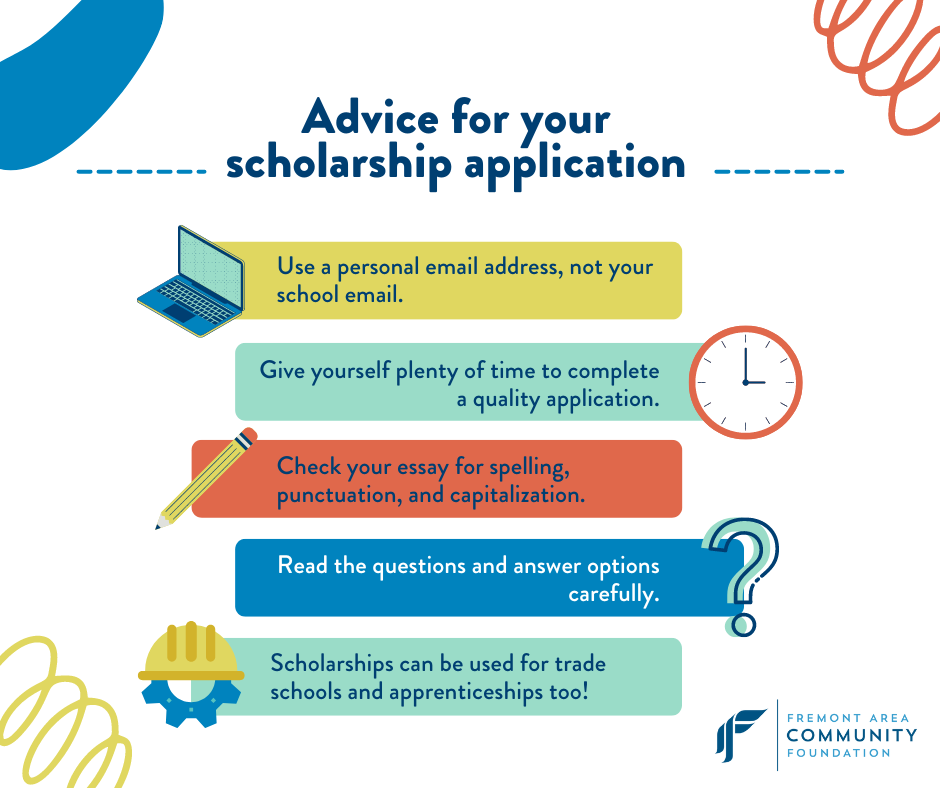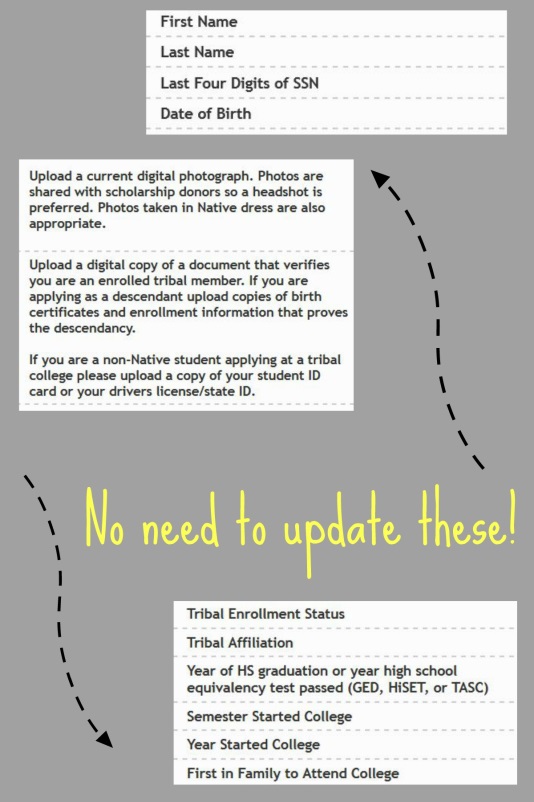How to Get the Most Out of Your Scholarship Application

Securing a scholarship can significantly ease the financial burden of education, but the application process can be daunting. Standing out from a pool of talented applicants requires more than just good grades; it demands a strategic and compelling presentation of your unique strengths and aspirations. This article serves as your comprehensive guide to maximizing your scholarship application's potential. We will explore key strategies, from identifying the right opportunities and crafting a persuasive personal essay to gathering compelling letters of recommendation and showcasing your accomplishments. By following these insights, you can increase your chances of securing the funding you need to achieve your academic dreams.
How to Maximize Your Scholarship Application for Success
To truly maximize your scholarship application, you need to approach it strategically and meticulously. It's not just about filling out forms; it's about presenting yourself as the ideal candidate the scholarship committee is looking for. This involves thorough research, compelling storytelling, and meticulous attention to detail. Understanding the scholarship's mission and aligning your experiences and aspirations with those values is crucial. Remember, scholarship committees read countless applications; your goal is to make yours stand out, resonating with their values and showcasing your unique potential. Moreover, proofread rigorously and seek feedback to ensure clarity, conciseness, and impact.
Understand the Scholarship's Criteria
Before even starting your application, thoroughly research the specific scholarship's goals, values, and eligibility requirements. Don't just glance at the basic criteria; delve deeper into the organization's mission statement and past award recipients. This understanding allows you to tailor your application to directly address what the scholarship committee is looking for, demonstrating a genuine interest and commitment to their cause. Tailoring to the specific criteria is crucial for success.
Craft a Compelling Personal Essay
The personal essay is your opportunity to showcase your personality, experiences, and aspirations. Don't simply recount your achievements; instead, weave a narrative that demonstrates how those experiences have shaped you and how the scholarship will help you achieve your future goals. Use vivid language and specific examples to create a memorable and impactful story. Ensure that the essay aligns with the scholarship's mission and showcases how you embody the values it promotes.
Highlight Your Achievements Strategically
Rather than listing every accomplishment, carefully select the ones that are most relevant to the scholarship's focus. Quantify your achievements whenever possible, using numbers and data to demonstrate the impact of your efforts. Focus on showcasing skills and experiences that align with the scholarship criteria and demonstrate your potential for future success. Make it very clear what you can offer if they decide to give you the scholarship.
Secure Strong Letters of Recommendation
Choose recommenders who know you well and can speak to your strengths, abilities, and potential. Provide them with ample time to write a thoughtful and personalized letter. Share your application materials with them, including your personal essay and a list of your achievements, so they can tailor their recommendation to highlight your qualifications for the specific scholarship. Recommenders should be able to illustrate your strengths with concrete examples.
Proofread Meticulously and Seek Feedback
Typos and grammatical errors can significantly detract from your application. Proofread your application multiple times and ask trusted friends, teachers, or mentors to review it as well. A fresh pair of eyes can often catch mistakes that you might have missed. Consider using online grammar and spelling checkers, but always rely on human review for a final check. A polished and error-free application demonstrates your attention to detail and commitment to quality.
| Aspect | Importance | Tips |
|---|---|---|
| Scholarship Understanding | Crucial | Research thoroughly; align your application with their values. |
| Personal Essay | High | Tell a compelling story; connect experiences to future goals. |
| Achievements | Important | Highlight relevant skills; quantify your accomplishments. |
| Recommendations | Significant | Choose recommenders wisely; provide them with sufficient information. |
| Proofreading | Essential | Proofread multiple times; seek feedback from others. |
How to stand out in a scholarship application?

Craft a Compelling Personal Essay
The personal essay is your opportunity to connect with the selection committee on a personal level. Don't just reiterate your resume; instead, tell a story that reveals your character, values, and motivations. Make sure to address the essay prompt directly and thoughtfully. Think about moments where you overcame a challenge, demonstrated leadership, or pursued a passion.
- Brainstorm thoroughly: Before you start writing, brainstorm a list of experiences, qualities, and insights that you want to convey.
- Show, don't tell: Use vivid language and specific examples to illustrate your points, rather than simply stating them.
- Proofread meticulously: Ensure your essay is free of grammatical errors and typos. Have someone else read it over for feedback.
Highlight Unique Experiences and Achievements
Scholarship committees are looking for students who are more than just high achievers; they want to see individuals who are engaged in their communities and have pursued unique experiences. Showcasing your passions and commitment to specific causes can significantly boost your application. Think about any extracurricular activities, volunteer work, or personal projects that demonstrate your skills and interests.
- Quantify your impact: Whenever possible, use numbers and data to illustrate the impact of your achievements (e.g., "Raised $5000 for a local charity" or "Tutored 20 students in math").
- Connect your experiences to your goals: Explain how your experiences have shaped your aspirations and prepared you for future success.
- Be authentic: Choose experiences that you are genuinely passionate about, as this will shine through in your application.
Tailor Your Application to the Specific Scholarship
Generic applications rarely stand out. Research the scholarship provider and understand their mission, values, and selection criteria. Customize your application to align with their specific goals. This shows that you've taken the time to understand what they're looking for and that you're genuinely interested in their program.
- Read the scholarship guidelines carefully: Pay close attention to the eligibility requirements, essay prompts, and application deadlines.
- Identify the scholarship's mission: Research the organization or individual behind the scholarship and understand their values and goals.
- Reflect their values in your application: Highlight experiences and qualities that align with the scholarship's mission.
Secure Strong Letters of Recommendation
Letters of recommendation provide valuable insights into your character, abilities, and potential from the perspective of teachers, mentors, or employers. Choose recommenders who know you well and can speak to your strengths with specific examples. Give them ample time to write a thoughtful and personalized letter.
- Ask your recommenders well in advance: Provide them with a deadline and any necessary materials, such as your resume, transcript, and a list of your accomplishments.
- Provide your recommenders with context: Explain why you are applying for the scholarship and what you hope to achieve with it.
- Thank your recommenders: Show your appreciation for their time and effort by sending them a thank-you note.
Present a Polished and Professional Application
First impressions matter. Ensure your application is well-organized, easy to read, and free of errors. A polished and professional application demonstrates your attention to detail and your commitment to excellence. Pay careful attention to formatting, grammar, and spelling.
- Proofread meticulously: Have multiple people review your application for errors before submitting it.
- Follow the instructions carefully: Adhere to all formatting guidelines and submission requirements.
- Submit your application on time: Don't wait until the last minute, as this can increase the risk of errors.
What is the #1 way to increase your chances for a scholarship?

Understanding Scholarship Criteria
Understanding what scholarship committees value is paramount. They typically assess applicants based on a combination of factors, including academic merit, financial need, leadership qualities, community involvement, and personal essays. Before you apply, review the scholarship's guidelines, and find out what is expected from its recipients.
- Academic Merit: Transcripts that showcase academic excellence, high GPAs, and challenging coursework.
- Extracurricular Involvement: Participation in activities that demonstrate leadership, teamwork, and commitment.
- Essays and Recommendations: Compelling essays that articulate your goals and aspirations, supported by strong letters of recommendation from teachers and mentors.
Maximizing Your GPA and Course Rigor
Your GPA is often the first thing scholarship committees look at. Aim for the highest GPA possible by consistently attending classes, completing assignments on time, and seeking help when needed. Whenever possible, challenge yourself with honors, AP, IB, or dual enrollment courses. These courses not only demonstrate your academic abilities but also prepare you for the rigors of college-level work.
- Focus on Core Subjects: Prioritize your performance in core academic subjects like math, science, English, and history.
- Take Advantage of Advanced Courses: Enroll in honors, AP, IB, or dual enrollment classes whenever possible to showcase your academic abilities.
- Seek Help When Needed: Don't hesitate to ask teachers for extra help or tutoring if you're struggling with a particular subject.
Demonstrating Leadership and Extracurricular Engagement
Scholarship committees want to see that you are not just academically gifted but also actively involved in your community and have the potential to be a leader. Join clubs, organizations, and sports teams that align with your interests and passions. Seek out leadership opportunities within these activities, such as becoming a club officer, team captain, or volunteer coordinator. Focus on a few activities where you can make a significant impact rather than spreading yourself too thin across many.
- Choose Activities You're Passionate About: Involvement in activities you genuinely enjoy will shine through in your application.
- Seek Leadership Roles: Take on leadership positions within your chosen activities to demonstrate initiative and responsibility.
- Document Your Accomplishments: Keep a record of your achievements and contributions in each activity to showcase your impact.
Crafting a Compelling Scholarship Essay
The scholarship essay is your opportunity to tell your story and demonstrate your unique qualities. Carefully read the essay prompt and address it directly. Be authentic, honest, and passionate in your writing. Highlight your accomplishments, but also share your challenges and how you overcame them. Proofread your essay meticulously to ensure it is free of grammatical errors and typos. Ask teachers, counselors, or mentors to review your essay and provide feedback.
- Understand the Prompt: Carefully analyze the essay prompt and address it directly.
- Tell Your Story: Share your personal experiences, goals, and aspirations in a compelling and authentic way.
- Proofread and Edit: Ensure your essay is free of grammatical errors and typos. Have others review it and provide feedback.
Securing Strong Letters of Recommendation
Letters of recommendation provide valuable insight into your character, work ethic, and potential from the perspective of teachers, counselors, or mentors. Choose recommenders who know you well and can speak to your strengths and accomplishments. Give your recommenders ample time to write their letters and provide them with all the necessary information, including your resume, transcript, and a brief summary of your goals. Thank your recommenders for their time and effort.
- Choose Recommenders Wisely: Select individuals who know you well and can speak to your academic abilities, character, and potential.
- Provide Ample Information: Give your recommenders your resume, transcript, and a brief summary of your goals.
- Thank Your Recommenders: Express your gratitude for their time and effort in writing your letters of recommendation.
What not to say in a scholarship application?

Exaggerating or Fabricating Information
- Never falsify your grades, extracurricular activities, or achievements. Scholarship committees verify information, and being caught in a lie will immediately disqualify you.
- Don't overstate your involvement in activities. If you only attended one meeting, don't claim to be a dedicated member.
- Avoid claiming skills or experiences you don't possess. This will be evident in your writing and could damage your credibility.
Being Overly Negative or Complaining
- Refrain from bad-mouthing teachers, schools, or past experiences. Focus on the positive aspects of your journey and what you've learned.
- Avoid dwelling on personal hardships without showing resilience. While it's okay to acknowledge challenges, emphasize how you overcame them and what you gained from the experience.
- Don't express negativity towards the scholarship provider or its mission. Demonstrate genuine interest and alignment with their values.
Expressing a Sense of Entitlement
- Never state or imply that you deserve the scholarship. Scholarships are earned, not given.
- Avoid demanding language or an expectation of receiving the award. Express gratitude for the opportunity and demonstrate your worthiness through your accomplishments and aspirations.
- Don't focus solely on your financial need without highlighting your merits. While financial need is a factor, it shouldn't be the primary reason for your application.
Using Informal Language or Poor Grammar
- Avoid slang, abbreviations, and casual language. Maintain a formal and professional tone throughout your application.
- Don't submit an application with grammatical errors, typos, or spelling mistakes. Proofread carefully or ask someone to review your application before submitting it.
- Refrain from using emojis or other informal communication elements. Your application should reflect maturity and professionalism.
Providing Vague or Generic Responses
- Avoid giving generic answers that could apply to anyone. Tailor your responses to the specific scholarship requirements and demonstrate your unique qualities.
- Don't rely on clichés or overused phrases. Show originality and express your thoughts in a clear and compelling manner.
- Refrain from simply listing your accomplishments without providing context or demonstrating impact. Explain how your achievements have contributed to your personal growth and the community.
Frequently asked questions
What are the key components of a compelling scholarship application?
A strong essay that showcases your personality, goals, and relevant experiences is crucial. Also, ensure you have excellent academic transcripts, strong letters of recommendation highlighting your character and abilities, and a well-structured application demonstrating your commitment to your field of study. Demonstrating financial need, if applicable, is also very important.
How can I make my scholarship essay stand out from other applicants?
To make your essay stand out, focus on telling a unique and personal story that reflects your passion, overcoming challenges, and future aspirations. Avoid generic statements and use concrete examples to illustrate your skills and experiences. Proofread carefully for grammar and spelling errors and ensure your essay directly answers the prompt while showcasing your individuality.
What should I do if I don't meet all the eligibility requirements for a scholarship?
Even if you don't meet all the eligibility requirements, it's still worth carefully reviewing the specifics. Sometimes there is room for interpretation, or one requirement is weighted less than others. Consider applying if you meet most of the key criteria and have a strong overall application. Furthermore, you can contact the scholarship provider to clarify eligibility specifics before applying.
How important are letters of recommendation, and how can I ensure they are strong?
Letters of recommendation are extremely important, as they provide an external validation of your qualities and potential. Choose recommenders who know you well and can speak specifically to your abilities and character. Give them ample time to write the letter and provide them with all the necessary information, including your resume, essay draft, and a clear explanation of the scholarship's goals. Encourage them to highlight specific examples of your achievements.
